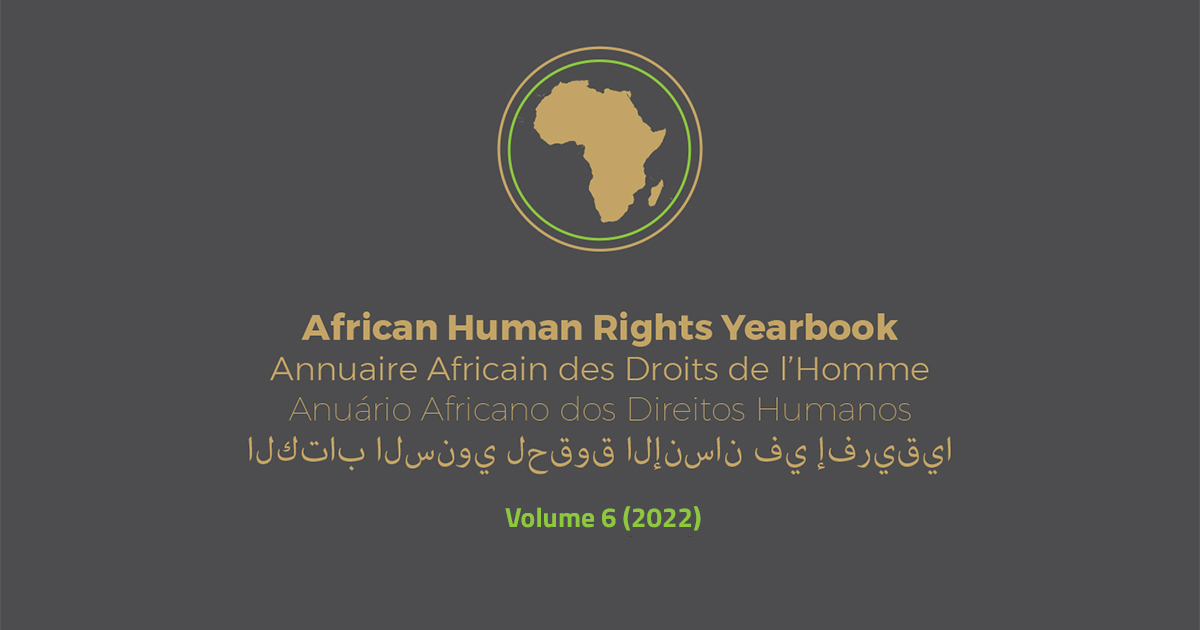The African Court on Human and Peoples’ Rights, the African Commission on Human and Peoples’ Rights, and the African Committee of Experts on the Rights and Welfare of the Child are pleased to announce the call for papers for the sixth volume of the African Human Rights Yearbook (AHRY).
Background to the yearbook
The African Court on Human and Peoples’ Rights, the African Commission on Human and Peoples’ Rights, and the African Committee of Experts on the Rights and Welfare of the Child are pleased to announce the call for papers for the sixth volume of the African Human Rights Yearbook (AHRY). The first volume, which was published at the end of 2017, comprised 17 articles, while the second volume contained a total of 23 contributions. It was published in early 2019. The third and the fourth volumes, published by the end of 2019 and 2020, comprised 25 and 24 contributions, respectively, with the fifth volume, published in 2021, containing 21 articles. This joint publication, which contains contributions in English, French, Portuguese and Arabic, has been initiated in the framework of the complementarity relationships among the three institutions.
Invitation for contributions
We are inviting abstracts for articles and case discussions that will propose ground-breaking academic-style contributions to the human rights discourse in Africa. Although the contributions are expected to take a continental approach to the issues they cover, country-specific or sub-regional level case studies that are designed in the light of the overall African human rights system will also be considered. In so far as methodology is concerned, contributions adopting multidisciplinary and empirical approaches are highly encouraged.
Submissions in three categories (A, B and C) are invited:
A. Articles focused on aspects of the African human rights system/ African Union human rights standards
In this section, the call is for articles about the African human rights system or African Union human rights standards, including their domestic application and interpretation.
B. Articles related to the African Union theme of the Year 2022:
‘Strengthening resilience in nutrition and food security on the African continent: Strengthening agro food systems, health and social protection systems for the acceleration of human, social and economic capital development’.
In this section, we invite articles that focus on the African Union’s theme of the year, which for 2022 is: ‘Year of Nutrition: Strengthening resilience in nutrition and food security on the African continent: Strengthening agro food systems, health and social protection systems for the acceleration of human, social and economic capital development.’ Authors are encouraged to explore issues related to food insecurity, access to basic social services, poverty, education and gender inequality in sanitation hygiene and water supply, adopting rights-based approach. Authors are also encouraged to explore issues particularly in the context of the targets of the Malabo Declaration on Accelerated Agricultural Growth for 2025.
C. Case commentaries
In view of the need to capitalise on the growing jurisprudence of the three organs, this section of the Yearbook aims to garner critical propositions to improve case law. Commentaries may be on a single decision, or on the case law of one of the three organs, separately, or provide perspectives on the case law of the three organs, jointly (by for example looking into cross -cutting jurisprudential issues, and complementarity).
Submission of abstracts and timetable
Abstracts should be of no more than 650 words to be submitted together with a short résumé (no more than 500 words) of the author’s professional qualifications and position. An abstract that is beyond the word limit will be screened out before examination. Abstracts should set out: the title of the article, a short description of the topic to be addressed, the methodological approach taken, a brief overview of the issues to be explored; and the anticipated findings or insights.
Abstracts should be submitted before or by 15 April 2022 as email attachments to ahry@up.ac.za
Any questions on this call for papers should be directed to the address given above.
A selection panel will consider the proposals and inform only the selected authors before or by 15 May 2022. On acceptance of a proposal by the selection panel, the authors will be invited to submit a full draft article or case discussion, together with an abstract of 200 words, by 31 July 2022. The papers will then undergo a double-blind peer review process. Upon review, the authors will receive comments, which they will be expected to incorporate and return the final paper by 30 September 2022.
Accepted papers will be published in the sixth volume of the Yearbook, which is expected to appear in December 2022.
Submission Guidelines
- The submission must be original and not have already been published or submitted elsewhere.
- Articles should be between 8 000 and 10 000 words (including footnotes) in length.
- Case comments should be between 5 000 and 8 000 words (including footnotes) in length, and should include web links to cases cited.
- Contributions may be submitted in Arabic, English, French or Portuguese; and should be edited for language before submission.
- Use UK English for papers submitted in English.
- Please adhere to the Pretoria University Law Press (PULP) style guidelines, www.pulp.up.ac.za/images/files/publish_with_pulp/Styleguidelines%202018.pdf.
Remuneration
Contributions to the African Human Rights Yearbook are not remunerated. However, in recognition of their intellectual work and the value it adds to the Yearbook, authors of finally accepted papers will be added to a database of thematic experts of the African Court, the African Commission, and the Children’s Committee.


